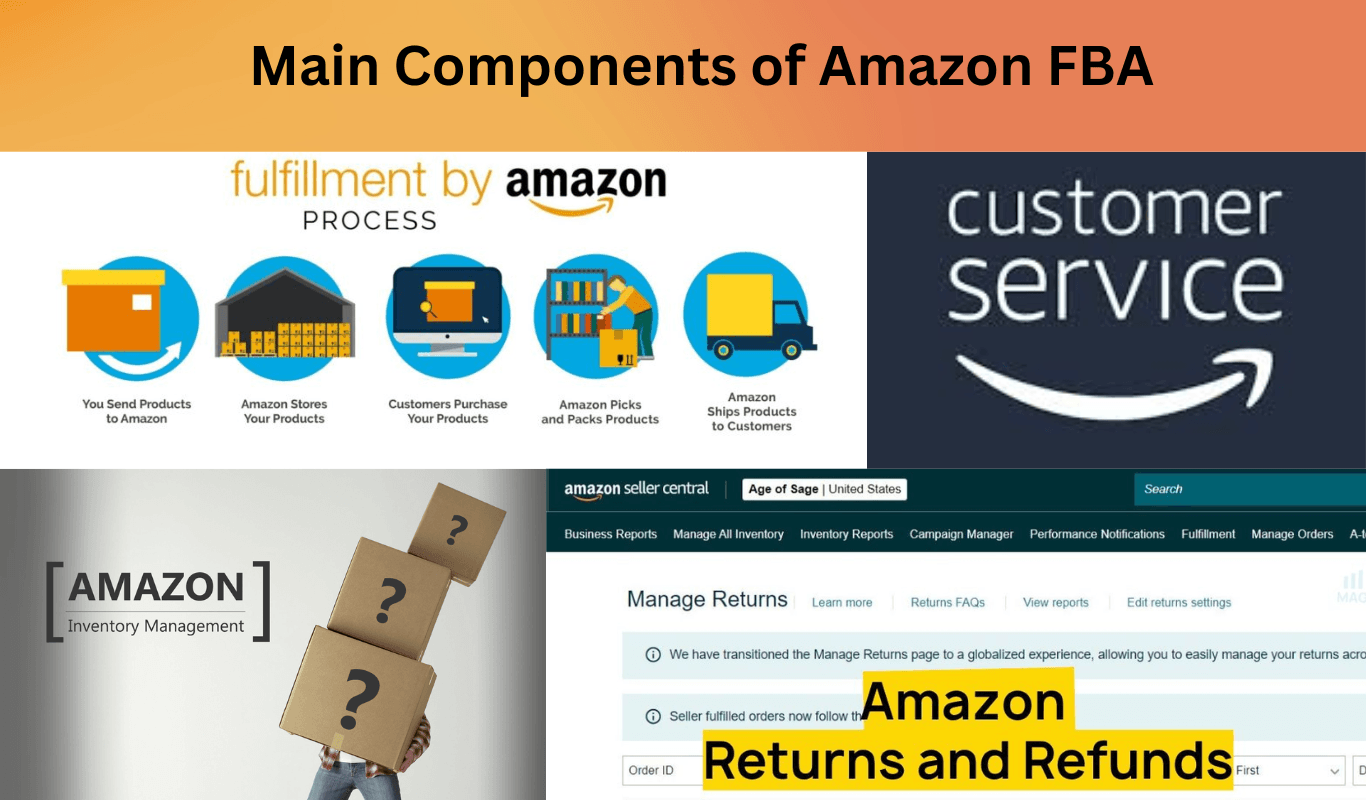Amazon FBA (Fulfillment by Amazon) is a service that allows sellers to outsource most of the fulfillment and logistics processes to Amazon. The FBA system is especially appealing to small and medium-sized businesses that want to scale up without the operational burdens of running their own warehouses or managing complex logistics. Below, we will explore the four main components that make up the Amazon FBA program: Inventory Storage, Order Fulfillment, Customer Service, and Returns Management. Here is all the information of about Main Components of Amazon FBA.
1. Inventory Storage (Fulfillment Centers)
One of the key aspects of Amazon FBA is inventory storage, where sellers send their products to Amazon’s fulfillment centers. These centers are massive warehouses spread across various locations worldwide, designed to store and organize inventory until it’s sold.
How it works: Once a seller chooses a product to list on Amazon, they can send their inventory directly to Amazon’s fulfillment centers. Amazon will store these products in its warehouses, keeping them organized and ready for shipping. Sellers can monitor their inventory levels using Amazon’s Seller Central dashboard to ensure they have enough stock on hand.
Benefits for sellers: By using Amazon’s storage, sellers save time and money that would otherwise be spent renting or maintaining their own warehouse space. This also allows businesses to scale quickly, as they don’t have to worry about the logistics of expanding their storage.
2. Order Fulfillment (Picking, Packing, Shipping)
Amazon FBA takes over the entire process of picking, packing, and shipping orders once a sale is made. This is often regarded as one of the most valuable components of FBA, as it relieves sellers of the hassle of managing fulfillment operations.
How it works: When a customer places an order, Amazon’s fulfillment center staff locates the product in storage, picks it, packages it securely, and ships it to the customer. Sellers don’t need to worry about hiring staff or dealing with packaging materials. Amazon also determines the best shipping method based on the delivery requirements and provides customers with tracking information for their orders.
Benefits for sellers: Sellers benefit from Amazon’s fast, reliable shipping service, which often includes access to Prime shipping. Prime members typically receive their orders in 1-2 days, a service that is difficult for independent sellers to offer on their own. Fast shipping boosts customer satisfaction and increases the likelihood of repeat purchases.
3. Customer Service
Another major component of Amazon FBA is customer service. Amazon manages all customer interactions related to shipping, product questions, returns, and refunds. For sellers, this means they don’t have to deal directly with customer inquiries, which can be time-consuming and challenging to manage.
How it works: When customers have a question about an order, delivery status, or product issue, they can reach out to Amazon’s customer service team. Amazon will respond on the seller’s behalf and work to resolve the issue. Amazon’s customer service is available 24/7, ensuring prompt responses to customer inquiries.
Benefits for sellers: Customer service can be one of the most resource-intensive parts of running an online business. By outsourcing it to Amazon, sellers can focus on growing their business without needing to staff a customer support team. Amazon’s highly regarded customer service helps foster trust and loyalty among buyers, which can lead to positive reviews and higher seller ratings.
4. Returns Management
Returns are inevitable in any e-commerce business, and Amazon FBA provides a streamlined process for handling them. Amazon takes care of all aspects of returns management, from receiving and inspecting returned products to issuing refunds to customers.
How it works: When a customer initiates a return, they follow Amazon’s return process. Amazon will accept the returned item, assess whether it can be resold, and process the refund for the customer. If the product is deemed unsellable, Amazon will notify the seller, and the seller can decide whether to have the item returned to them or disposed of by Amazon.
Benefits for sellers: Managing returns can be a logistical headache for sellers. By letting Amazon handle the process, sellers avoid dealing with return shipping, customer complaints, or restocking. Moreover, Amazon’s returns management is simple and convenient for buyers, which encourages repeat business and builds trust.
Check out our Amazon FBA Services for your store.










